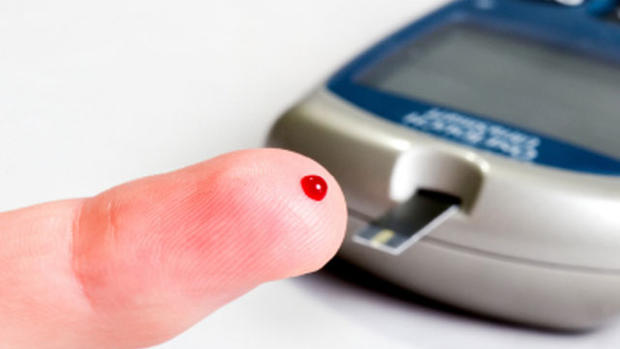Rising Type 2 diabetes rates linked to increases in high fructose corn syrup consumption
A new study shows that high fructose corn syrup consumption rates go hand in hand with higher prevalence of Type 2 diabetes.
Researchers discovered that Type 2 diabetes rates are 20 percent higher in countries where high fructose corn syrup (HFCS) is consumed the most, compared to disease rates in countries with low consumption.
"This research suggests that HFCS can increase the risk of Type 2 diabetes, which is one of the most common causes of death in the world today," said co-author professor Stanley Ulijaszek, director of the Institute of Social and Cultural Anthropology at the University of Oxford in England, in a press release.
About 25.8 million Americans have diabetes, accounting for about 8.3 percent of the U.S. population, according to the American Diabetes Association. Of those people, 7 million do not realize they have the disease.
Type 2 diabetes -- when the body does not produce enough insulin or the pancreas does not utilize the insulin -- is the most common form of diabetes. Insulin is a hormone that helps the cells absorb glucose, the sugars and starches in your food. Researchers estimate that 8 percent of the world could be diabetic by 2030.
For the study, published online Nov. 27 in Global Public Health, researchers looked at worldwide data collected from 2000, 2004 and 2007 by the Global Burden of Metabolic Risk Factors Collaborating Group that looked at diabetes prevalence and body mass index (BMI). The information came from 199 countries and included data on adults over 20. Researchers also looked at United Nations food consumption trends to see what diets were like in various countries, looking closely at the sugars and cereals that made up typical meals. High fructose corn syrup intake was recorded in 43 countries.
Daily calories, BMI and total sugar intake was similar no matter where people lived around the world, the researchers found. However, countries with high levels of high fructose corn syrup consumption had significantly higher rates of diabetes.
America came in number one in consumption: People consumed on average 55 pounds of high fructose corn syrup each year. Following the U.S. was Hungary (46 pounds), Slovakia, Canada, Bulgaria, Belgium, Argentina, Korea, Japan and Mexico. The high consumption countries had a Type 2 diabetes prevalence of about 8 percent.
"Most populations have an almost insatiable appetite for sweet foods, but regrettably our metabolism has not evolved sufficiently to be able to process the fructose from high fructose corn syrup in the quantities that some people are consuming it," Ulijaszek said in a press release. "Although this syrup can be found in many of our processed foods and drinks, this varies enormously from country to country."
Lowest consumption countries were Australia, China, Denmark, France, India, Ireland, Italy, Sweden, the United Kingdom and Uruguay, which all consumed about 1.1 pounds of high fructose corn syrup per person per year. Their diabetes prevalence was around 6.7 percent.
- Diabetes rates rise in South, triple in Oklahoma
- 371 million people have diabetes globally, about half undiagnosed
- Lack of sleep may lead to insulin issues
Study author Dr. Michael Goran, co-director of the Diabetes and Obesity Research Institute at the Keck School of Medicine at the University of Southern California, said to WebMD that while we know what kind of sugar makes up table sugar -- about 50 percent fructose, 50 percent glucose -- the level of fructose fluctuates from 42 to 55 percent in high fructose corn syrup. A 2011 study in Obesity put that percentage even higher at 47 to 65 percent.
He also believes there's a difference with fructose in fruit, which has fiber that can slow down absorption, and fructose that's refined. Researchers believe this higher level of fructose in corn syrup could be what's driving Type 2 diabetes.
"It's a question of the good, the bad and the ugly, with an apple -- which has about 10 grams of fructose in it -- being good, the fructose in [table] sugar being bad, and the fructose in high fructose corn syrup being the ugly," he added.
Audrae Erickson, president of the Corn Refiners Association, said in a statement to HealthDay that the study doesn't show that high fructose corn syrup causes diabetes. He pointed out that it is up to consumers to watch how many calories and sugars they consume in their diet.
"Just because an ingredient is available in a nation's diet does not mean it is uniquely the cause of a disease," she said. Looking at the study data, she noted that "even though Japan consumes more high fructose corn syrup every year than Mexico, the prevalence rates of diabetes in Japan are about half of Mexico," he said.
Marion Nestle, professor of food, nutrition studies, and public health at New York University in New York, added to WebMD that both high fructose corn syrup and table sugar are made of the same two simple sugars, fructose and glucose, and the body reacts the same way to them.
"(The study) is based on a questionable and highly debatable premise: that high-fructose corn syrup is significantly different in its physiological effects from sucrose, or table sugar," she said.

